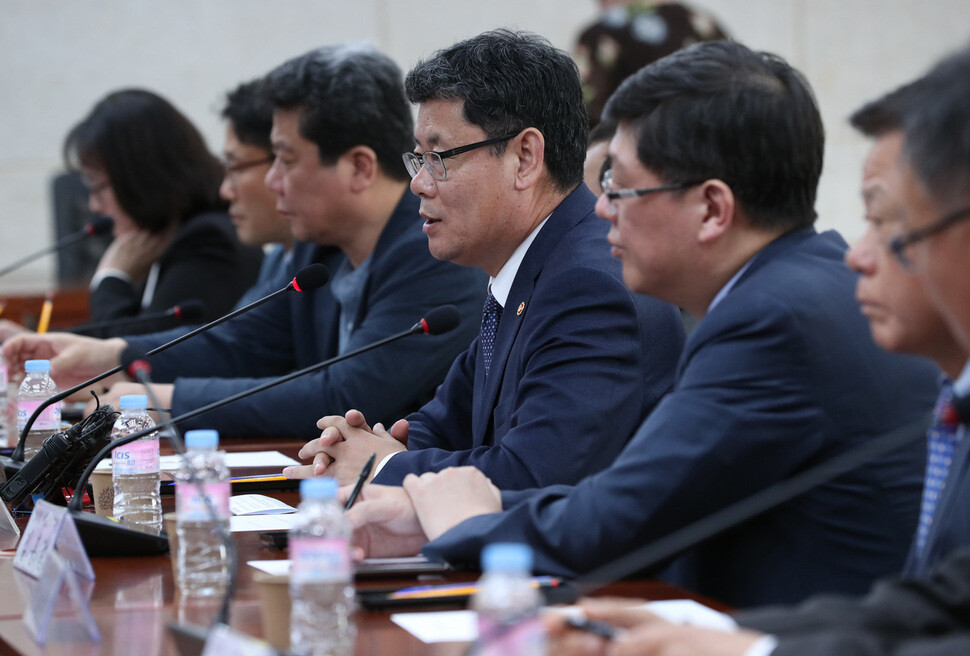hankyoreh
Links to other country sites 다른 나라 사이트 링크
Unification minister discusses aid to N. Korea with private sector and religious groups

“If the government were to [provide humanitarian aid to North Korea] not only through UN bodies but also through domestic religious organizations and the KCRC [Korean Council for Reconciliation and Cooperation] and KNCCK, it would be able to reduce its political burden and also improve monitoring,” said Park Chang-il, the chair of the Korean NGO Council for Cooperation with North Korea’s (KNCCK) “Peace 3,000” Operating Committee. The KNCCK is a council that represents NGOs involved in humanitarian aid to the North.
Park was talking to South Korean Unification Minister Kim Yeon-chul in a meeting aimed at soliciting views about humanitarian aid to North Korea. The meeting was held at the inter-Korean dialogue office in the Samcheong neighborhood of Seoul’s Jongno District on the afternoon of May 14.
“The organizations that have gathered here today have more than 20 years of experience with providing humanitarian aid to North Korea. They’ve carried out numerous negotiations and a great deal of monitoring work,” Park said.
Considering that inter-Korean relations have been affected by North Korea-US relations, which is preventing humanitarian aid from being delivered to the North in a timely fashion, Park explained, NGOs with considerable experience at providing humanitarian aid to the North could have a part to play.
“If the South Korean government allows us to access roads and railroads to Kaesong, roads to Mt. Kumgang and the harbors of Nampo, Incheon, Busan, and Wonsan, we’ll be able not only to help the North Korean public but also play a major role in inter-Korean exchange and cooperation,” Park said.
The meeting on Tuesday was organized to collect advice about the scale, timing, and need for aid from private sector and religious groups with extensive humanitarian aid experience before the government moves ahead with giving North Korea food aid. The meeting was attended by 17 representatives from three organizations: the KNCCK, the KCRC, and the Korean Conference of Religion and Peace, which represents the seven largest religious faiths in the country.
“The participants in the meeting agreed about the need to provide aid to North Korea in a timely fashion. They asked for [the government’s] prompt assistance for procedures including shipping supplies to facilitate private sector aid to the North,” the Unification Ministry said.
“We will continue reviewing food aid for humanitarian purposes and because of our concern for our fellow Koreans in the North. But given the need for public consensus and support, we plan to make a sufficient effort to canvas public opinions about providing such aid,” the Ministry quoted Minister Kim Yeon-chul as saying.
By Noh Ji-won, staff reporter
Please direct comments or questions to [english@hani.co.kr]

Editorial・opinion
![[Guest essay] The real reason Korea’s new right wants to dub Rhee a founding father [Guest essay] The real reason Korea’s new right wants to dub Rhee a founding father](https://flexible.img.hani.co.kr/flexible/normal/500/300/imgdb/original/2024/0423/8317138574257878.jpg) [Guest essay] The real reason Korea’s new right wants to dub Rhee a founding father
[Guest essay] The real reason Korea’s new right wants to dub Rhee a founding father![[Column] ‘Choson’: Is it time we start referring to N. Korea in its own terms? [Column] ‘Choson’: Is it time we start referring to N. Korea in its own terms?](https://flexible.img.hani.co.kr/flexible/normal/500/300/imgdb/original/2024/0423/3617138579390322.jpg) [Column] ‘Choson’: Is it time we start referring to N. Korea in its own terms?
[Column] ‘Choson’: Is it time we start referring to N. Korea in its own terms?- [Editorial] Japan’s rewriting of history with Korea has gone too far
- [Column] The president’s questionable capacity for dialogue
- [Column] Are chaebol firms just pizza pies for families to divvy up as they please?
- [Column] Has Korea, too, crossed the Rubicon on China?
- [Correspondent’s column] In Japan’s alliance with US, echoes of its past alliances with UK
- [Editorial] Does Yoon think the Korean public is wrong?
- [Editorial] As it bolsters its alliance with US, Japan must be accountable for past
- [Guest essay] Amending the Constitution is Yoon’s key to leaving office in public’s good graces
Most viewed articles
- 1[Column] ‘Choson’: Is it time we start referring to N. Korea in its own terms?
- 2Senior doctors cut hours, prepare to resign as government refuses to scrap medical reform plan
- 3Why Korea shouldn’t welcome Japan’s newly beefed up defense cooperation with US
- 4Opposition calls Yoon’s chief of staff appointment a ‘slap in the face’
- 5[Guest essay] The real reason Korea’s new right wants to dub Rhee a founding father
- 6Terry Anderson, AP reporter who informed world of massacre in Gwangju, dies at 76
- 7[Column] The clock is ticking for Korea’s first lady
- 8[Editorial] Japan’s rewriting of history with Korea has gone too far
- 9New AI-based translation tools make their way into everyday life in Korea
- 10Survey: S. Koreans spend more time using smartphones than eating